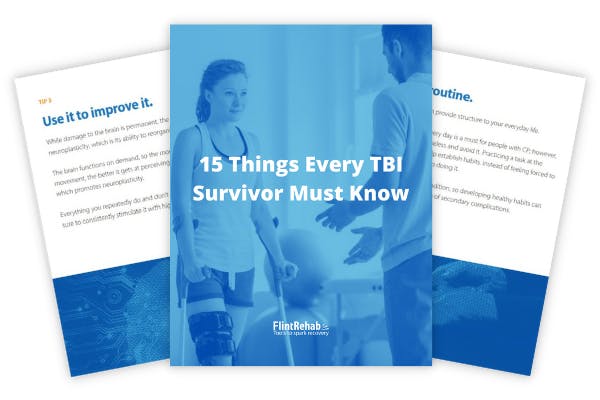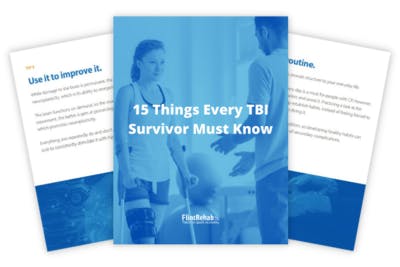No products in the cart.
No products in the cart.
No products in the cart.
No products in the cart.
Home » Neurological Recovery Blog » Traumatic Brain Injury » Mild Traumatic Brain Injury: Understanding What “Mild” Means & How to Recover
Last updated on February 14, 2022

Mild traumatic brain injury (TBI) may be more serious than many people realize. If the proper steps are not taken, patients can experience symptoms for months, sometimes years, after their injury.
That’s why it is crucial to take the right approach to mild traumatic brain injury recovery from the beginning. With a good treatment plan, you can give your brain the tools it needs to heal successfully from mild traumatic brain injury.
To help you identify and treat mild traumatic brain injury, this article will discuss:
A mild traumatic brain injury refers to a bump or a blow to the head or body that causes the brain to rapidly move back and forth in the skull. This disrupts brain function and results in a loss of consciousness for that lasts for less than 30 minutes.
A traumatic brain injury is classified as “mild” if the individual scores a 13 or higher on the Glasgow Coma Scale. Mild traumatic brain injury can be caused by various events, including falls, car accidents, violence, sports-related injuries, or explosive blasts.
Depending on the context, people may also refer to mild traumatic brain injury as a concussion. These terms are generally used interchangeably. However, recently some medical specialties have begun to try to distinguish them, with concussion referring to an even milder version of a mild traumatic brain injury.
As there has been no clear consensus yet as to what separates a concussion from a traumatic brain injury, we’ll be using these terms interchangeably throughout this article.
Some of the most common signs and symptoms of mild traumatic brain injury include:
These signs and symptoms are a normal part of mild traumatic brain injury and are not necessarily signs of permanent damage. They should subside as your brain heals.
However, there are some potential long-term effects of concussion to be aware of. Talk to your doctor if you’re concerned you have lingering effects.
Many concussion symptoms can also occur after an injury to the neck, known as whiplash. Whiplash and mild traumatic brain injury frequently co-occur and may result in identical symptoms, but are separate conditions that require separate treatments.

Most concussion symptoms will resolve on their own, but some can turn in to life-threatening conditions.
Seek immediate medical attention if any of these symptoms are present:
Once you’ve been treated for any serious complications from your mild traumatic brain injury, you can begin working on your recovery by using the techniques in the following sections.
Mild traumatic brain injury recovery can take some time. However, there are some proven ways to promote a faster recovery. These include:
These methods should help reduce your overall recovery time. As always, talk to your doctor if your symptoms decline or do not improve.
Want 20 pages of brain injury recovery tips in PDF form? Click here to download our free ebook “15 Things Every TBI Survivor Must Know” (link opens a pop up for uninterrupted reading)
The average recovery time for a mild traumatic brain injury is less than 14 days for most adolescents without a history of motion sickness or migraine. For older individuals, it can take a little longer, but even then, symptoms typically only last about three to four weeks.
If your concussion symptoms last for more than a month, you may have developed post-concussion syndrome. There is no need for alarm if that is the case. Even though it can take a long time, it is possible to treat post-concussion syndrome and make a full recovery.
Symptoms of mild traumatic brain injury can be more severe than many people realize. However, most individuals will make a full recovery, as long as they don’t overexert themselves.
If you allow yourself enough rest, stay hydrated, and gradually increase your activities, your symptoms should improve quickly. We hope this guide helps you take the steps needed to fully recover from concussion.

If you like our content, you’ll love our ebook and newsletters! Get instant access to our TBI recovery tips ebook with 20 pages of helpful advice by signing up below.
You’ll also receive our emails that share survivor stories and more useful TBI recovery tips, which you can opt out of at any time. (We know you’ll love them, too.)
We will never sell your email address, and we never spam. That we promise.


Time with a speech therapist is extremely valuable during recovery, especially if you struggle with communication, critical thinking, or memory after brain injury. Insurance typically covers speech therapy for a fixed amount of time. But once it’s over, recovery is in your hands.
That’s why a team of neuroscientists and clinicians from Boston University created the CT Speech & Cognitive Therapy app. Designed for those recovering from stroke, TBI, or living with neurological conditions, the app contains over 100,000 cognitive exercises that are all available right from your phone or tablet. That’s like having a speech therapist by your side whenever you want!
This app is the perfect fit if you want to improve your speaking, memory, or general mental sharpness. And, it’s affordable at just $29.99/month!
“For the past 6 months, my son has used the app about three times a week. The app is like a virtual therapist, it’s very easy to use, and it gives him immediate feedback.
He now understands things faster, can make decisions with less hesitation, has improved recognition of words, and his confidence is higher. I also find it easy to get in touch with customer service; they pleasantly help out. The whole experience has been great.”
— Miriam
With the CT App, you can get the guidance you need right from your phone or tablet. You can use it on your own or in between sessions with your speech therapist.
Whether you struggle with aphasia, memory loss, or critical thinking, the CT Speech & Cognitive Therapy App can help.
“The CT app has helped me gather my confidence by building on and reinforcing old forgotten skills. It helps to see my percentages increase, and work harder when they decrease. It’s very self-motivating.” -Kathryn
We are confident that this app will help improve your speech and cognitive function after brain injury. Like our recovery tools, the CT App is also covered by our 30-day money-back guarantee.

Do you know these 15 TBI recovery tips?
Get a free copy of our ebook 15 Things Every TBI Survivor Must Know. Click here to get instant access.
Grab a free rehab exercise ebook!
Sign up to receive a free PDF ebook with recovery exercises for stroke, traumatic brain injury, or spinal cord injury below: